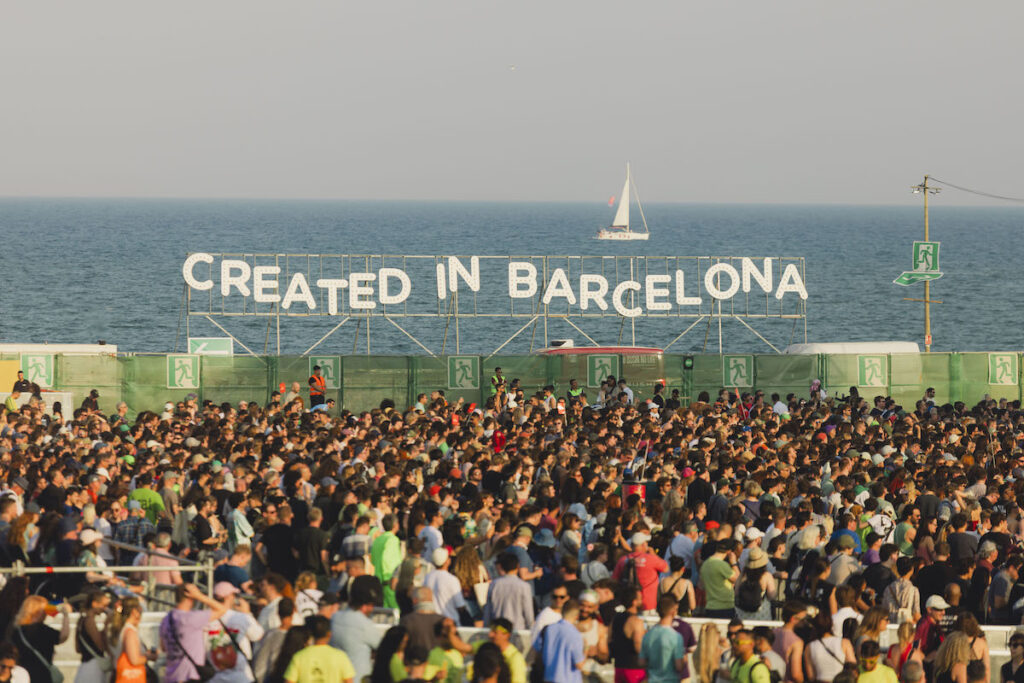With the Powerpuff Girls, Charli XCX, Sabrina Carpenter and Chappell Roan, the festival has its most global headliners ever, surrendering to pop.
Barcelona exerts a magnetic attraction on contemporary creativity. One of the key hubs of this ecosystem is Primavera Sound, which took place by the sea in the Parc del Fòrum once again this year.
This annual international gathering cements the festival’s status as more than just a musical event; it is a phenomenon that puts the Catalan capital at the forefront of the artistic scene. The 2025 edition set a new attendance record of 293,000 people, including 71,000 each day, plus 20,000 at the Primavera concerts around the city. Considering the 71,000 daily attendees, the 20,000 at the Primavera concerts and the 30,000 at the free Opening Day and closing electronic party, Primavera Bits by Nitsa, the festival attracted a total of 343,000 people.
The festival sold out five months before it began. “This has been a historic edition that has turned Barcelona into the epicentre of music for a week,” said Alfonso Lanza, the festival’s co-director, during last Saturday’s press conference. The desire to experience Primavera Sound has crossed more borders than ever before. The international audience climbed seven points since last year to represent 65% of the total, with an average age of 29 and spending 300 million euros in the city. This year’s edition attracted visitors from 136 countries, leaving few unrepresented at the Fòrum venue, and 13 new countries were added since last year. The audience from Barcelona accounted for 25% of the total, while the United Kingdom once again led the way as the country with the most visitors, followed by the United States and Italy.
‘We are one of the top three international festivals; we are a competitive festival,’ said Marta Pallarés, head of institutional relations at Primavera Sound. This vision is a far cry from the first festival edition held in 2001 at Poble Espanyol. The festival’s promoters — Alberto Guijarro, Pablo Soler and Gabi Ruiz — were nostalgic fans of 1990s indie music who wanted to bring their favourite bands to the Catalan capital.
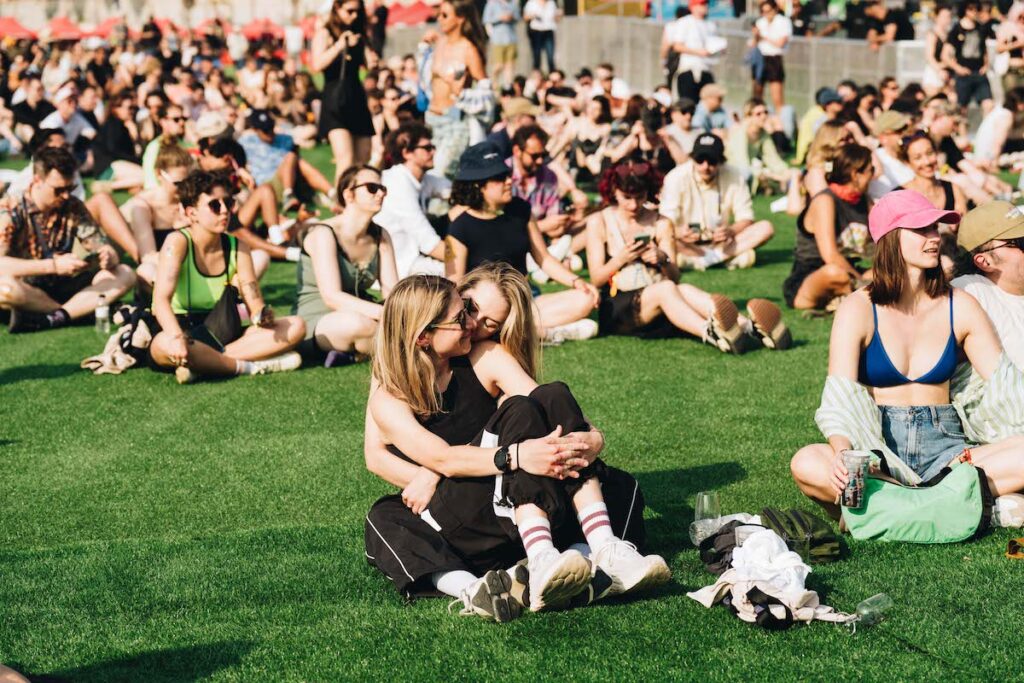
This year’s edition had a particularly strong international focus, which was evident in one of the most talked-about highlights of the line-up: the joint concert by Charli XCX and Troye Sivan. These two leading figures in queer pop chose Barcelona to present their only shared show in Europe, titled SWEAT.
Their performance on the first night of the festival was one of the most celebrated moments, embodying the event’s spirit: a crossroads of aesthetics, geographies, and identities that transforms Barcelona into the emotional and creative epicentre of global music, both during the festival and long afterwards.
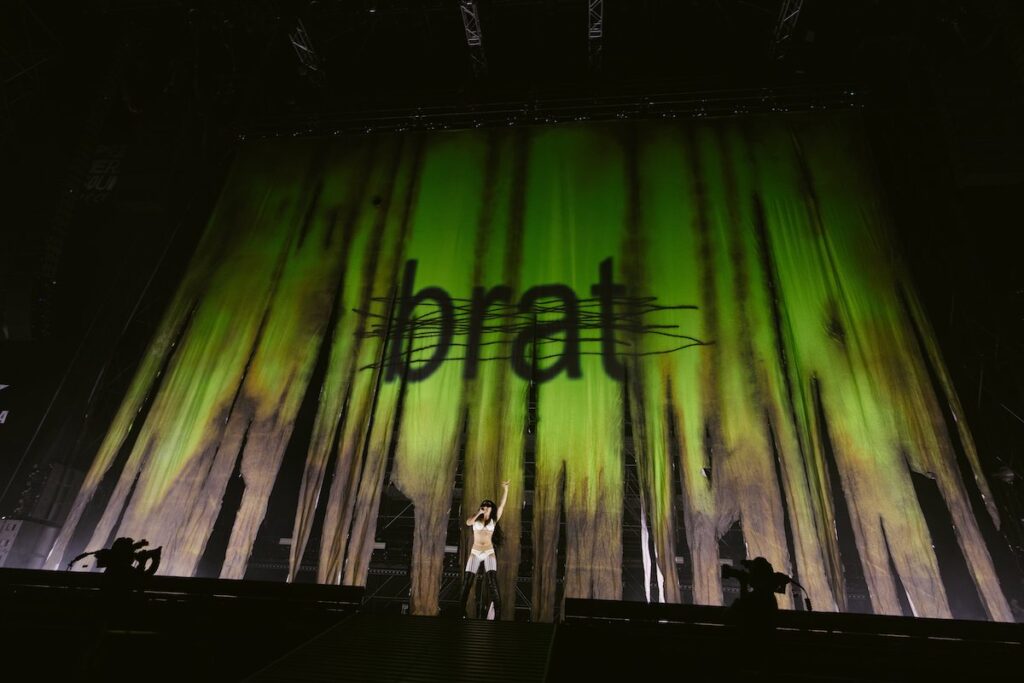
The British singer’s entrance onto the stage was notable for one detail in particular: she dropped a curtain in the now iconic green Brat colour, but this time it was torn and splattered with brown stains. This was in perfect synchrony with the modified cover that had appeared on Spotify that same week. This was a statement of intent, marking exactly one year since the album’s release. This acid green colour, as contradictory as the era it represents, has become so synonymous with Generation Z that Pantone should consider officially renaming it. It is a visual manifesto of humour, disgust, irony and desire. Charli celebrated this with an abrasive and resounding live performance, reinterpreting her songs as if she needed to break them into a thousand pieces in order to reshape them. ‘365’, ‘Von Dutch’, ‘Everything is Romantic’ — far from nostalgia, everything sounded rawer, rougher and brighter. When Chappell Roan appeared on the stage screens for the viral dance to ‘Apple’, it wasn’t just a nod between the two headliners; it was the final scene of a film that could be said to have been in the making for a year. This film established a new breed of pop queens: imperfect, queer queens whose natural habitat had never been the main stage of such a hegemonic festival.
Meanwhile, Troye Sivan found the perfect place to celebrate his 30th birthday on the same stage, surrounded by screams and hugs erupting from the dance floor. He performed ‘Rush’ and ‘One of Your Girls’ as if they were anthems of personal and generational consecration. His gratitude to the audience, expressed in broken but sweet Spanish, reinforced that intimate connection. There were moments of complicity between the two artists as they interacted with each other and sang two collaborations, ‘1999’ and an electric finale with ‘Talk Talk’.
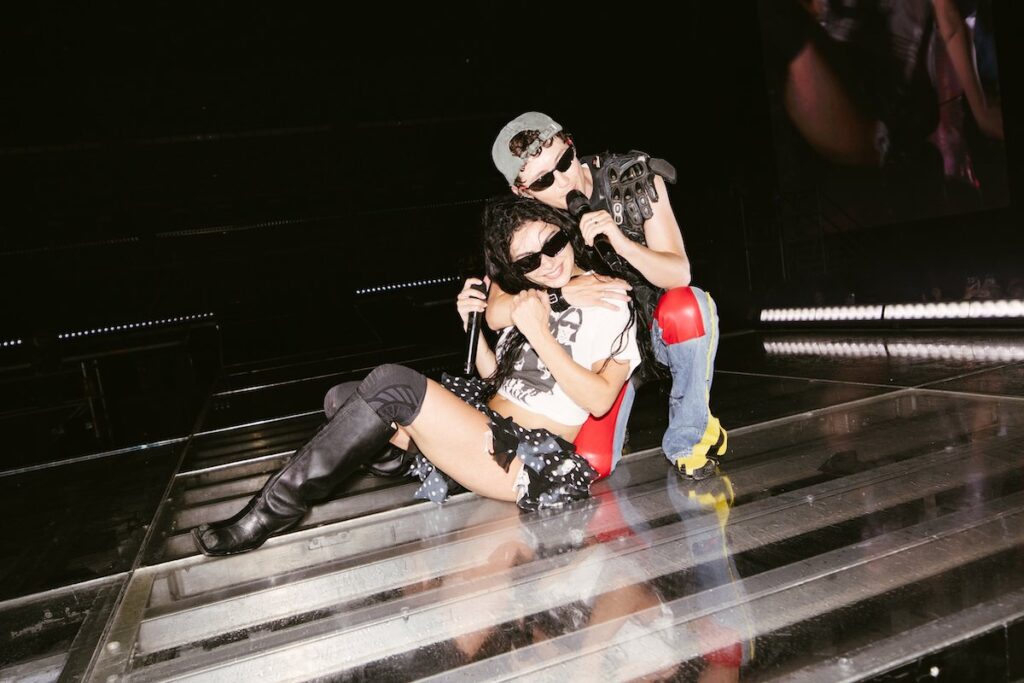
Just hours earlier, the same stage had witnessed a completely different kind of performance. FKA Twigs delivered a performance that defied categorisation, a pop style in which labels and pronouns had no place. With an aura built on conceptual dance and a supporting scaffold that would later be used in the SWEAT tour, the concert took shape amid pole dance bars, wig changes, tonal shifts, and precise lighting that complemented the delicate nature of a set that was as progressive as it was fragile.
While pop reigns supreme at Primavera, the ravers emerge from their burrows at dawn. Brutalismus 3000 blew the physical and conceptual foundations of the Parc del Fòrum to smithereens. Victoria Vassiliki and Theo Zeitner took to the stage with a combative attitude, armed with industrial beats, guttural screams, black flags, and a filthy rhythm that transformed the space into a post-apocalyptic rave. Their live show delivered on its name, offering sonic brutalism and beats from the year 3000. Without any narrative structure or calculated crescendos, they sounded like a post-capitalist Kraftwerk with a speed-fuelled hangover who had decided to smash their own synthesizers to make rave-punk in a squatted warehouse. In a festival where much of the electronic music seeks to be elegant and commercial, Brutalismus 3000 chose to stage an exorcism: they were ugly and uncomfortable, but absolutely memorable.
On the second day of the festival, the spotlight was on Sabrina Carpenter’s highly anticipated performance. With her trademark long blonde hair, feminine makeup and sequinned dress, the American artist demonstrated how to create a star persona in front of the TikTok mirror. Her Spanish debut was a spectacle of pink visuals, complete with country airs, meticulous choreography and a perfect smile. Despite closing the concert with her signature song, ‘Espresso’, the singer caused a frenzy with her now classic ‘Juno position’, which this time consisted of firing two confetti guns. Another of the concert’s cathartic moments was the hot version of ‘It’s Raining Men’, with the audience giving their all and raising the temperature in Barcelona. “Guapa, guapa, guapa” (beautiful, beautiful, beautiful), the audience chanted, treating her like the Virgin of Macarena. ‘Oh no, not this again,’ replied the pop star, confused and unaware that she was being canonised. Shortly afterwards, she received an impromptu lesson in Catalan from the small local audience and ended up saying the unintelligible ‘T’estimo’ (I love you). It’s the thought that counts, though.
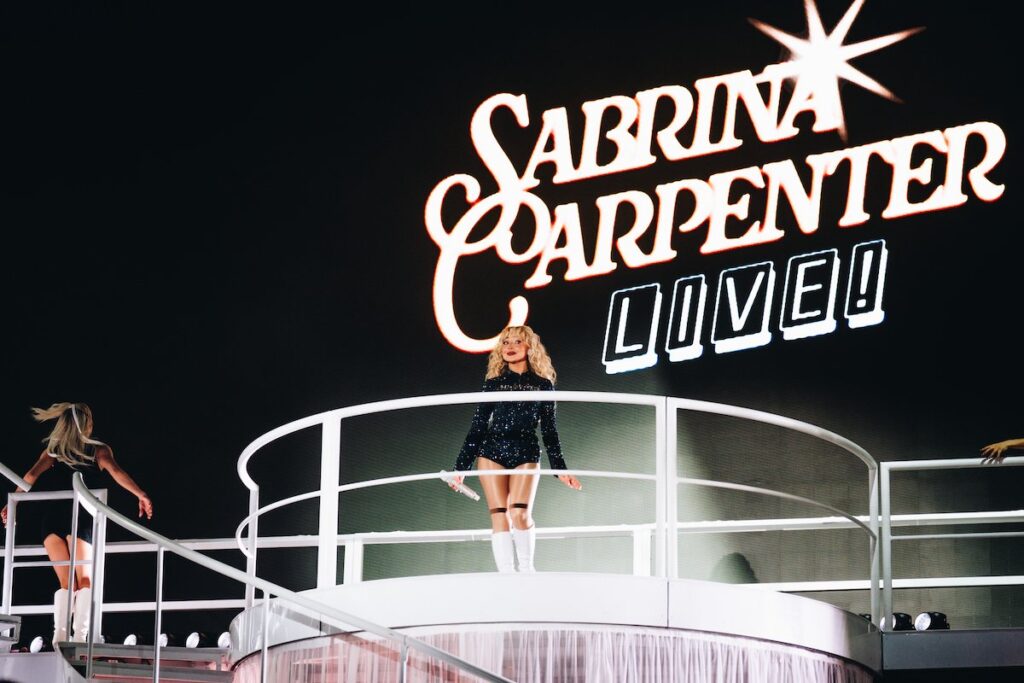
Those who didn’t have it easy were Madrid’s Carolina Durante, who performed after Carpenter. Despite this, Diego Ibáñez, who was on crutches and still recovering from a ligament injury, managed to capture the essence of the national music scene at its prime. There was an explosion of energy with key songs from the band, such as ‘Hamburguesas’ and ‘Normal’, the collaboration with Rosalía that broke the algorithm of the chulapo musicians. The Catalan artist attended the band’s concert and appeared with them in a golf cart, although she did not come on stage.
Belgian DJ Amelie Lens, a leading figure on the global electronic scene, sponsored the tunnel towards the end of the night. The bass drums seemed to have a life of their own, offering the crowd a much-needed sensory escape and a space in which to let go of everything they had experienced that day. With her signature long bob, austere black clothing, and unflappable gaze behind the decks, Lens exudes style through her favourite medium: sound. Dry, deep and elegant, with no need for embellishment. The DJ represents a techno orthodoxy that sweeps the dance floor with no frills or concessions — just her and her discretion, supported only by artificial smoke and strobe lights.
On the last day of the festival, there was an emotional hangover, but there were still some big names left to perform. The polyphony of the various stages culminated in a grand finale with the final headliner, Chappell Roan. On the Estrella Damm stage, under a cloud-filled sky that never released any rain, Roan presented herself not only as a singer, but also as a performer with a unique identity.
The fantastical theme of her stage show was crowned with butterfly styling, a gothic aura, and impossible make-up that transformed this lesbian icon into a versatile artist who brought her music to the brink of a drag show. The theatricality that characterises her work is a statement of intent from someone who isn’t pretending to be a pop star — she is one, and she does it her way. Before the concert, she invited her fans to expose their exes and then read out their messages on stage. With confessions, self-irony and an unfiltered display of personality, the audience completely immersed themselves in songs such as ‘HOT TO GO!’, ‘Good Luck, Babe!’ and ‘Pink Pony Club’.
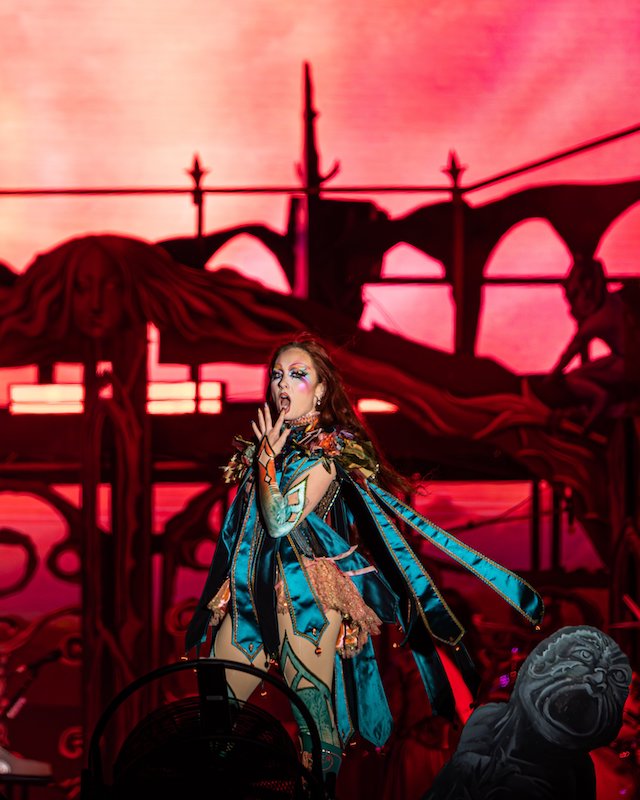
When restraint seemed impossible, Amaia appeared like a gentle sea breeze in the middle of a storm. In one of the day’s most eagerly awaited national concerts, the young singer performed without explosive visuals or over-the-top stage design. Relying on her raw, delicate voice, she performed with the delicacy of an ancient artist, as if she had performed many times before.
The audience held their collective breath when she performed ‘Ya está’ with a harp, once again showing that ‘artist’ is not only the term that best defines her, but also one she can wear with pride. Her restraint is not born of shyness, fear or insecurity, but of conviction.
It is a form of gentle resistance that imposes itself without violence, like someone who knows they can inhabit a space without filling it. Amaia does not need to disguise herself; it is enough for her to be herself: a crack in the excess. On the intimate Schwarzkopf stage, a more intimate than open space, Yung Beef put the national underground in its place.
He reminded us once again why, despite everything, he remains an indispensable anomaly within the Spanish musical ecosystem. His live performance was premeditated chaos: a fragment of roughness and street life amidst the pop glitz. He doesn’t sing well, he doesn’t sound clean, and he doesn’t seek harmony. But he doesn’t need to: his visceral, murky music reeks of sewage, open wounds and truth.
At a festival where many acts conformed to the prevailing style, his charisma of authenticity stood out. The Granada-born artist took us on a journey into his imagination. He took us on a journey through his origins, the reggaeton of La Mafia del Amor, broken anthems and his most kitsch and unhinged alter ego, Fernandito Kit Kat, to his most recent songs. Each stop revealed a different facet of his identity: the nihilistic MC; the autotuned crooner in ruins; the toxic lover; the disenchanted preacher; the broken man.
There was no nostalgia, only reappropriation. Rather than celebrating his past, he crushed and spat it out as an act of pride and self-affirmation. The show was a profane procession through his heels, where the visuals spoke of sins and failed redemption. The end of this inverted liturgy came with ‘Ready pa Morir’. Not as a closing hit, but as a twisted prayer — a prayer from the mud. It is not sung, but dragged out; it does not seek comfort, but confession. It is the final stop on a journey through demons that cannot be exorcised, but which become your bedfellows.
The 2025 edition has increased its international appeal by choosing more mainstream artists. This year, the festival has opted for the trio of pop divas of the moment, christened the ‘Powerpuff Girls’. They are immensely popular with Generation Z and are the muses of the LGTBIQ+ audience that the festival represents.
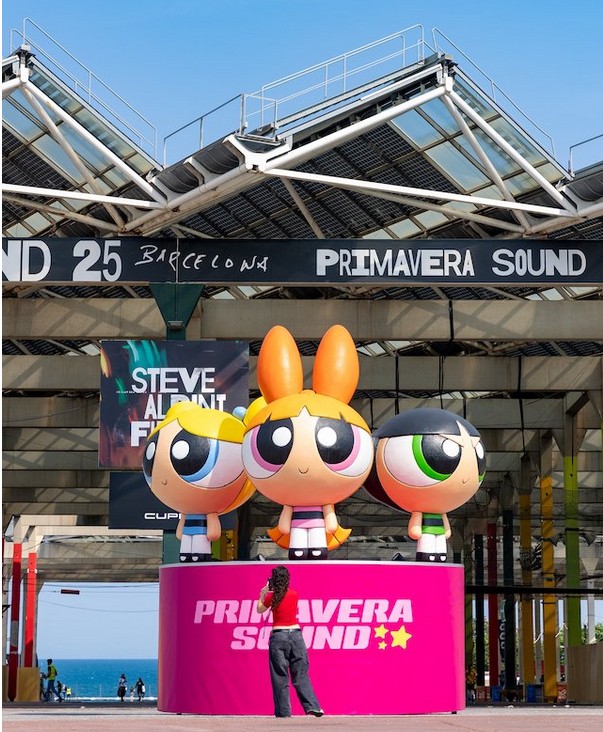
Primavera Sound has become a kind of queer oasis, attracting more fans with each edition of the long weekend event. However, amid negotiations between Barcelona City Council and Primavera Sound SL regarding the event’s renewal in the same space for three or four more years, the potential construction of a football stadium on the maritime platform has raised questions about the deal’s continuity. The organisers remain calm, as they claim to have the council’s commitment to securing a vital concert venue, given its status as the location of the main stages. For now, the hundreds of thousands of people who want to experience a dream week can rest assured that the dates for the 2026 edition have been confirmed as 4–6 June.


